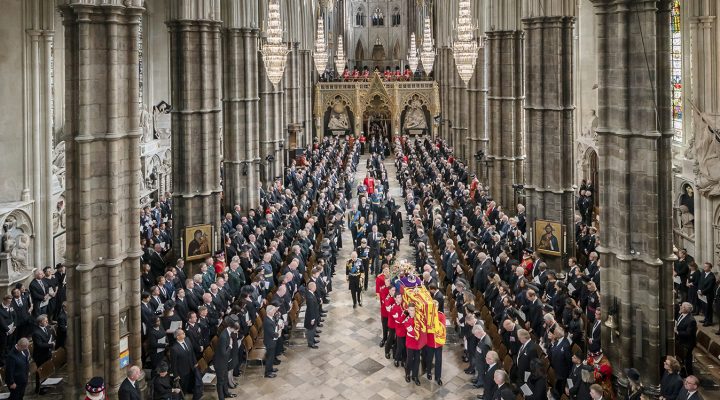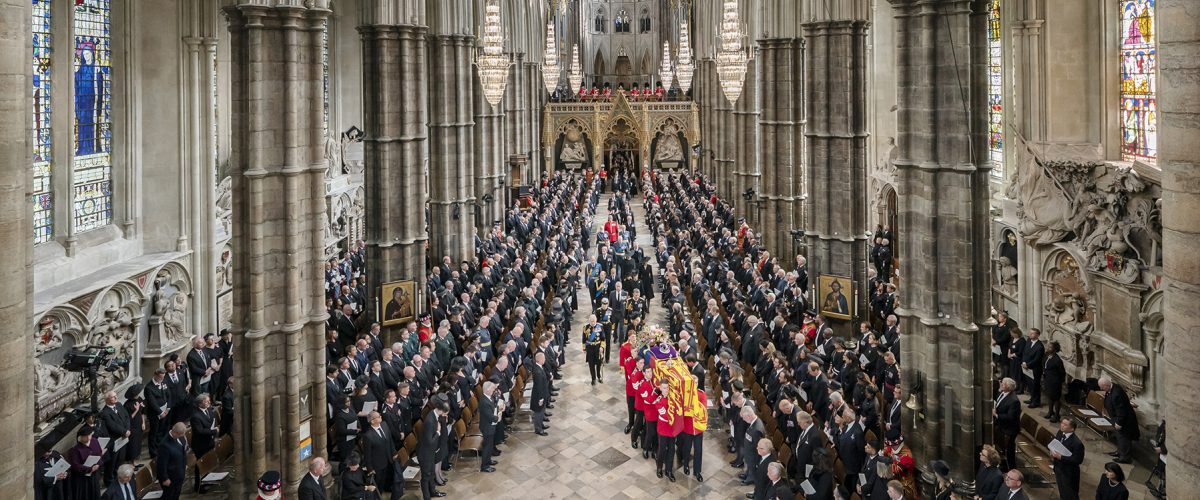The queen is dead. Long live the king.
From my earliest childhood memories during World War II, Elizabeth has been a constant in my life — a changeless symbol of stability during unstable times.
By an accident of timing, I was in Oxford when the new prime minister was elected, and I saw the pictures of the very frail queen still doing her duty, welcoming Liz Tuss. Then, on Friday, on the eve of my granddaughter’s wedding in Italy, word quickly spread among us: “The Queen is dead.”
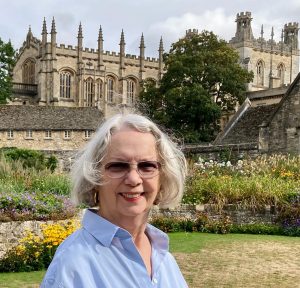
Ella Prichard
And eight days later, I was back in England, where I counted myself privileged to be among the English as they mourned their queen. We shall not see the likes of her — or the pageantry, ritual and assemblage of world leaders for her state funeral — again. The second Elizabethan Age has ended.
Duty. Honor. Country. God.
Virtues honored more today in the breach than in practice, virtues the queen embodied and the traditional Anglican funeral ritual captured so perfectly. Vows made in youth and kept over a long lifetime. She was described as a “servant leader,” a term we use so often in the church and witness so seldom.
Flashback. In 2011, during a tour of the Scottish Highlands, our group called on Lady Grace Macpherson-Grant at Ballindalloch Castle. She was about my age, and she described how her father inherited the title and the lands upon the death of his uncle when she was 6. Her parents explained to her then, “Someday this will all be yours.” She was reared to manage a huge estate and as laird, to represent the queen in the county. She quipped, “I had to find a man who would love me and my castle.”
As I watched the visible signs of succession this past week — Charles stepping into the role of king and William into Prince of Wales — I was most touched by the presence of young George and Charlotte (that little girl, dressed in funeral black with a broad-brimmed hat) at the funeral. Did you catch a glimpse of that moment when William entered Westminster Abbey and Kate stepped forward with the children to join him? William took George’s hand to lead him up the aisle. George, so often impish and mischievous in the photos, bit his lower lip, and William’s brow was deeply furrowed — lines I had never seen before. I could imagine the conversation he had had with George, “Someday this will all be yours.” At the age of 9, George is being trained to be king someday.
“I wonder if we are doing our children a service in giving them the privileges of adulthood without the responsibilities.”
How very different from how we rear our children. We want them to enjoy childhood and the “college experience.” We want to give them time to “find themselves.” We want to protect them from the burdens and responsibilities of adulthood for as long as possible. My bank has a term for the twenties — “emerging adults.” I wonder if we are doing our children a service in giving them the privileges of adulthood without the responsibilities.
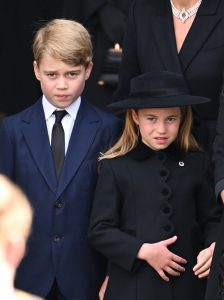
Prince George of Wales and Princess Charlotte of Wales during the State Funeral of Queen Elizabeth II at Westminster Abbey on September 19, 2022 in London, England. (Photo by Karwai Tang/WireImage)
The royal family provided a stark visual reminder that with privilege comes responsibility. Harry, who rejected the responsibilities of royalty, and Andrew, who “broke the rules,” were part of the family but clearly distinguished from the “working royals.” That’s a fine line, one that would be difficult for most of us to imagine. A modern parable of the Prodigal Sons.
When I was young, I really didn’t understand the value of the rituals of death. At times I thought the family should simply gather at home for a time of remembrance, shared stories and prayers. Other times I wanted a service with just the minister and the Mormon Tabernacle Choir. But eight decades of life have exposed me to a lot of loss, and I have come full circle.
I watched the queen’s funeral in my room at Gravetye Manor, an old country house hotel about 20 miles southeast of London, before going downstairs for lunch and then on to Heathrow for my flight back to Texas. The mood in the hotel was somber and quiet, but in English fashion staff carried on. My driver was a Hungarian who has lived in London 18 years but does not regard himself as English.
“I’m not religious,” he told me immediately, “but I was moved by the funeral service.”
“I’m not Anglican, but I was moved too,” I replied.
“Surely, it’s a comfort to Anglicans that the same words that apply to the queen apply to them.”
For all the pomp and circumstance, it was still the familiar liturgy from the Book of Common Prayer, read at Anglican funerals around the world for centuries — the same words of comfort and hope from the Gospel of John, the prayers and hymns, the brief homily that bore testimony to the queen’s faith and to the sure confidence in eternal life. As I told my driver, “Surely, it’s a comfort to Anglicans that the same words that apply to the queen apply to them, that they are equal in God’s sight regardless of their status here.”
I fear I am out of step with most in my generation on the subject of funerals. When my husband, Lev, died 13 years ago, I didn’t want a celebration of his life. I wanted a funeral, where we could grieve but be reminded of our hope in Christ. Too often today, I leave a service feeling like I have been to a roast. At the queen’s service, the homily and the prayers captured all that truly mattered in the queen’s life. Eulogies would have been a distraction.
I didn’t see anyone celebrating the queen’s death. Even the most strident anti-monarchists were mostly silent and respectful. Certainly the faces on the king and his queen, on William and Kate, now prince and princess of Wales, belied any state of joy about their newly elevated positions. They all appeared older, bowed down by heavy new responsibilities, by the fact that their old lives are gone — and of course, by their grief that they have lost their mother, their grandmother, their great-grandmother.
As the cameras panned the family at the end of the service, as the congregation sang “God Save the King,” it seemed to me that they sang it as a prayer and fervent hope for Charles. The future — for the family, the nation and the Commonwealth — is uncertain.
Flashback. On Jan. 20, 1961, at his inaugural address, John F. Kennedy spoke those famous words that inspired my generation:
And so, my fellow Americans: Ask not what your country can do for you, ask what you can do for your country.
My fellow citizens of the world: Ask not what America will do for you, but what together we can do for the freedom of man.
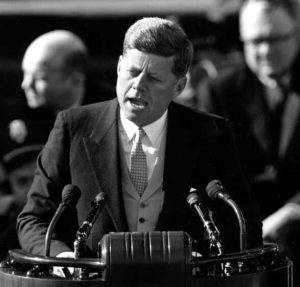
During his inaugural speech on Jan. 20, 1961, U.S. President John F. Kennedy issued a call to service.
Finally, whether you are citizens of America or citizens of the world, ask of us here the same high standards of strength and sacrifice which we ask of you. With a good conscience our only sure reward, with history the final judge of our deeds, let us go forth to lead the land we love, asking his blessing and his help, but knowing that here on earth God’s work must truly be our own.
We were 21 and ready to change the world. Friends signed up for the new Peace Corps. Many entered ministry and chose professions of service. For a brief moment we celebrated Camelot. But then came assassinations and racial conflict, Vietnam and Watergate. And Ayn Rand and Milton Friedman and the glorification of libertarianism. It’s all about me and my rights and my freedoms, even in the church.
In recent years I have frequently wondered how today’s audience would react to a speech like Kennedy’s. Sadly, I suspect there would be widespread ridicule and rejection of the old-fashioned virtues of duty, honor, country, God.
Perhaps that is why we Americans of a certain age celebrate and mourn the queen. She was our last thread to forgotten virtues of faith and patriotism.
Ella Wall Prichard is a journalism graduate of Baylor University who is known as a philanthropist and advisor to Baptist causes in Texas and beyond. She was a member of the Baylor Board of Regents and a director of the Baylor Alumni. Her book, Reclaiming Joy: A Primer for Widows, recounts the story of her husband’s untimely death and her suddenly finding herself the president of the family oil business. A longtime resident of Corpus Christi, Texas, her primary residence now is in Dallas, where she is a member of Wilshire Baptist Church.
Related articles:
Condolences and clarity concerning the death and life of Queen Elizabeth | Opinion by Wendell Griffen
King Charles should abolish the term ‘Defender of the Faith’ | Opinion by Michael Friday
The monarchy Christians | Opinion by Rodney Kennedy
An angry tweet about colonialism while others pay tribute to Queen Elizabeth
Womanhood, white Christian nationalism and Queen Elizabeth | Opinion by Greg Garrett
I love the recognition of a life, but the obsession with the monarchy still bothers me | Opinion by Russ Dean

